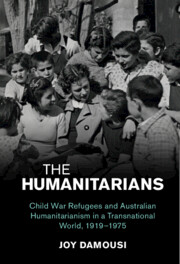 The Humanitarians
The Humanitarians Max Harris and the Australian Foster Parents Plan in Asia
from Part III - Assimilating and Adopting
Published online by Cambridge University Press: 28 July 2022
Chapter 10 explores the work of Foster Parents Plan (PLAN), whose presence in the Asian region began in the 1950s, extending its scope beyond Europe from where it originated during the Spanish Civil War. PLAN was distinct from other humanitarian programmes in that it developed a child sponsorship scheme. The language of development, financial assistance to so-called Third World nations and humanitarian aid invariably reflected earlier practices of colonialism, such as sending administrators to colonies and developing narratives of Western superiority. PLAN at this time shows a hybrid form of humanitarianism in which the organisation never entirely relinquished its charity label. The human rights campaigns that marked this period were absent from PLAN’s firmly embedded form of humanitarianism, which retained elements of colonial paternalism as well as newly formed concepts of social justice, underpinned by moralism. Max Harris, Australian writer, poet and journalist, took an active and leading role in promoting the aims of PLAN in the region. He did so with great zest and enthusiasm. A study of the correspondence with the children that Harris sponsored, which aimed to capture the voices of children, reveals these voices were severely compromised and appropriated to serve the fundraising endeavours of PLAN itself. These attempts reflected Western constructs that aimed to elevate PLAN donors and sponsors to the status of saviours of ‘Third World’ countries and communities and satisfy their gaze.
To save this book to your Kindle, first ensure no-reply@cambridge.org is added to your Approved Personal Document E-mail List under your Personal Document Settings on the Manage Your Content and Devices page of your Amazon account. Then enter the ‘name’ part of your Kindle email address below. Find out more about saving to your Kindle.
Note you can select to save to either the @free.kindle.com or @kindle.com variations. ‘@free.kindle.com’ emails are free but can only be saved to your device when it is connected to wi-fi. ‘@kindle.com’ emails can be delivered even when you are not connected to wi-fi, but note that service fees apply.
Find out more about the Kindle Personal Document Service.
To save content items to your account, please confirm that you agree to abide by our usage policies. If this is the first time you use this feature, you will be asked to authorise Cambridge Core to connect with your account. Find out more about saving content to Dropbox.
To save content items to your account, please confirm that you agree to abide by our usage policies. If this is the first time you use this feature, you will be asked to authorise Cambridge Core to connect with your account. Find out more about saving content to Google Drive.